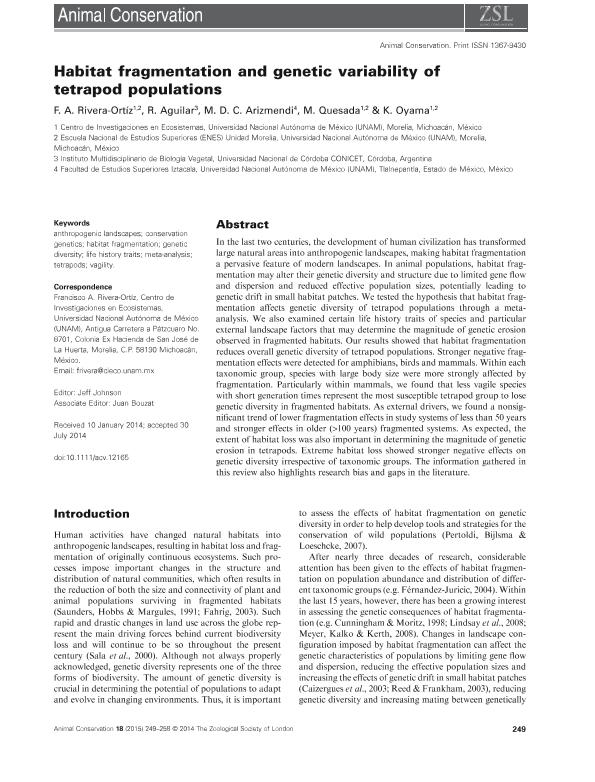Artículo
Habitat fragmentation and genetic variability of tetrapod populations
Fecha de publicación:
06/2015
Editorial:
Wiley
Revista:
Animal Conservation
ISSN:
1367-9430
e-ISSN:
1469-1795
Idioma:
Inglés
Tipo de recurso:
Artículo publicado
Clasificación temática:
Resumen
In the last two centuries, the development of human civilization has transformed large natural areas into anthropogenic landscapes, making habitat fragmentation a pervasive feature of modern landscapes. In animal populations, habitat fragmentation may alter their genetic diversity and structure due to limited gene flow and dispersion and reduced effective population sizes, potentially leading to genetic drift in small habitat patches. We tested the hypothesis that habitat fragmentation affects genetic diversity of tetrapod populations through a meta-analysis. We also examined certain life history traits of species and particular external landscape factors that may determine the magnitude of genetic erosion observed in fragmented habitats. Our results showed that habitat fragmentation reduces overall genetic diversity of tetrapod populations. Stronger negative fragmentation effects were detected for amphibians, birds, and mammals. Within each taxonomic group, species with large body size were more strongly affected by fragmentation. Particularly within mammals, we found that less vagile species with short generation times represent the most susceptible tetrapod group to lose genetic diversity in fragmented habitats. As external drivers, we found a non-significant trend of lower fragmentation effects in study systems of less than 50 years and stronger effects in older (>100 years) fragmented systems. As expected, the extent of habitat loss was also important in determining the magnitude of genetic erosion in tetrapods. Extreme habitat loss showed stronger negative effects on genetic diversity irrespectively of taxonomic groups. The information gathered in this review also highlights research bias and gaps in the literature.
Palabras clave:
Conservation Genetics
,
Genetic Variability
,
Vertebrates
,
Meta-Analysis
Archivos asociados
Licencia
Identificadores
Colecciones
Articulos(IMBIV)
Articulos de INST.MULTIDISCIPL.DE BIOLOGIA VEGETAL (P)
Articulos de INST.MULTIDISCIPL.DE BIOLOGIA VEGETAL (P)
Citación
Rivera Ortíz, F. A.; Aguilar, Ramiro; Arizmendi, M. D. C.; Quesada, M.; Oyama, K.; Habitat fragmentation and genetic variability of tetrapod populations; Wiley; Animal Conservation; 18; 3; 6-2015; 249-258
Compartir
Altmétricas




